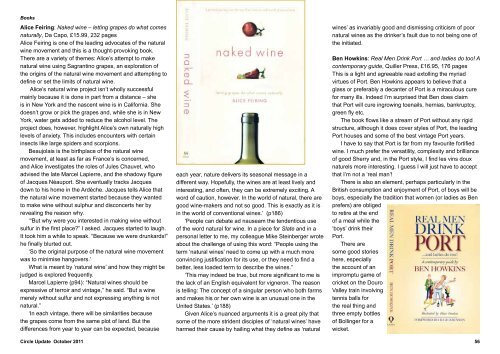You also want an ePaper? Increase the reach of your titles
YUMPU automatically turns print PDFs into web optimized ePapers that Google loves.
BooksAlice Feiring: Naked wine – letting grapes do what comesnaturally, Da Capo, £15.99, 232 pagesAlice Feiring is one of the leading advocates of the naturalwine movement and this is a thought-provoking book.There are a variety of themes: Alice’s attempt to makenatural wine using Sagrantino grapes, an exploration ofthe origins of the natural wine movement and attempting todefine or set the limits of natural wine.Alice’s natural wine project isn’t wholly successfulmainly because it is done in part from a distance – sheis in New York and the nascent wine is in California. Shedoesn’t grow or pick the grapes and, while she is in NewYork, water gets added to reduce the alcohol level. Theproject does, however, highlight Alice’s own naturally highlevels of anxiety. This includes encounters with certaininsects like large spiders and scorpions.Beaujolais is the birthplace of the natural winemovement, at least as far as France’s is concerned,and Alice investigates the roles of Jules Chauvet, whoadvised the late Marcel Lapierre, and the shadowy figureof Jacques Néauport. She eventually tracks Jacquesdown to his home in the Ardèche. Jacques tells Alice thatthe natural wine movement started because they wantedto make wine without sulphur and disconcerts her byrevealing the reason why.‘“But why were you interested in making wine withoutsulfur in the first place?” I asked. Jacques started to laugh.It took him a while to speak. “Because we were drunkards!”he finally blurted out.‘So the original purpose of the natural wine movementwas to minimise hangovers.’What is meant by ‘natural wine’ and how they might bejudged is explored frequently.Marcel Lapierre (p94): “Natural wines should beexpressive of terroir and vintage,” he said. “But a winemerely without sulfur and not expressing anything is notnatural.”‘In each vintage, there will be similarities becausethe grapes come from the same plot of land. But thedifferences from year to year can be expected, becauseeach year, nature delivers its seasonal message in adifferent way. Hopefully, the wines are at least lively andinteresting, and often, they can be extremely exciting. Aword of caution, however. In the world of natural, there aregood wine-makers and not so good. This is exactly as it isin the world of conventional wines.’ (p186)‘People can debate ad nauseam the tendentious useof the word natural for wine. In a piece for Slate and in apersonal letter to me, my colleague Mike Steinberger wroteabout the challenge of using this word: “People using theterm ‘natural wines’ need to come up with a much moreconvincing justification for its use, or they need to find abetter, less loaded term to describe the wines.”‘This may indeed be true, but more significant to me isthe lack of an English equivalent for vigneron. The reasonis telling: The concept of a singular person who both farmsand makes his or her own wine is an unusual one in theUnited States.’ (p188)Given Alice’s nuanced arguments it is a great pity thatsome of the more strident disciples of ‘natural wines’ haveharmed their cause by hailing what they define as ‘naturalwines’ as invariably good and dismissing criticism of poornatural wines as the drinker’s fault due to not being one ofthe initiated.Ben Howkins: Real Men Drink Port … and ladies do too! Acontemporary guide, Quiller Press, £16.95, 176 pagesThis is a light and agreeable read extolling the myriadvirtues of Port. Ben Howkins appears to believe that aglass or preferably a decanter of Port is a miraculous curefor many ills. Indeed I’m surprised that Ben does claimthat Port will cure ingrowing toenails, hernias, bankruptcy,green fly etc.The book flows like a stream of Port without any rigidstructure, although it does cover styles of Port, the leadingPort houses and some of the best vintage Port years.I have to say that Port is far from my favourite fortifiedwine. I much prefer the versatility, complexity and brillianceof good Sherry and, in the Port style, I find les vins douxnaturels more interesting. I guess I will just have to acceptthat I’m not a ‘real man’!There is also an element, perhaps particularly in theBritish consumption and enjoyment of Port, of boys will beboys, especially the tradition that women (or ladies as Benprefers) are obligedto retire at the endof a meal while the‘boys’ drink theirPort.There aresome good storieshere, especiallythe account of animpromptu game ofcricket on the DouroValley train involvingtennis balls forthe real thing andthree empty bottlesof Bollinger for awicket.<strong>Circle</strong> <strong>Update</strong> October 2011 56


